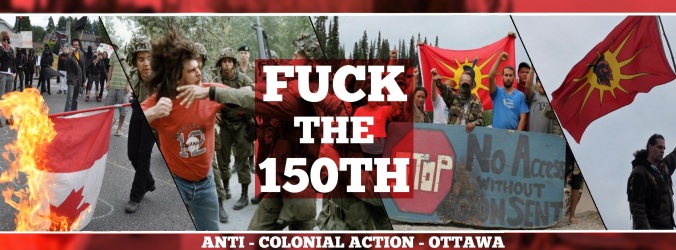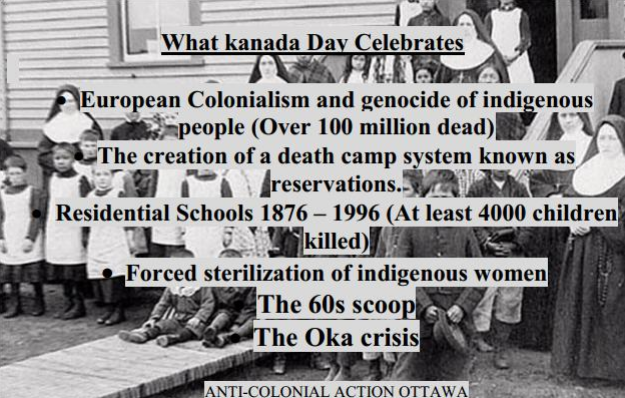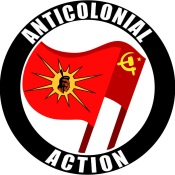 This document is being written by Anti-Colonial Action as an attempt to shed light on our work in Ottawa, to have a critical look both at what we have created and where we did not achieve our goals. We recognize that we have not published anything concerning what we have been doing, what has been going on, and even whether or not we are still active. We understand that this leads to a lot of questions, and makes it unclear what Anti Colonial Action has done and has not done. The purpose of this document is to shed light on us, our work, our shortcomings, and why things have gone the way they did. We are also calling for the reconstruction of our group so that we can build on our foundational work and move forward with Anti-Colonial Action in Ottawa.
This document is being written by Anti-Colonial Action as an attempt to shed light on our work in Ottawa, to have a critical look both at what we have created and where we did not achieve our goals. We recognize that we have not published anything concerning what we have been doing, what has been going on, and even whether or not we are still active. We understand that this leads to a lot of questions, and makes it unclear what Anti Colonial Action has done and has not done. The purpose of this document is to shed light on us, our work, our shortcomings, and why things have gone the way they did. We are also calling for the reconstruction of our group so that we can build on our foundational work and move forward with Anti-Colonial Action in Ottawa.
Though not completely successful in our work, we are still incredibly proud that we were able to put forward the politics we have so far, that we could build the organization we did, and that we still dare to struggle!
All documents referenced here will be linked at the end of this work.
The Founding of a Truly Anti Colonial Organization: Our First Months
Anti-Colonial Action – Ottawa (ACA) was founded and began its work in the summer of 2016. This was the first attempt by revolutionary Indigenous people in Ottawa to self-organize a radical alternative to the liberalism that held down the Indigenous movement in the city. We grew from our disappointment with Indigenous leaders in the activist community. We grew from a realization of their betrayal to us and to Indigenous liberation.
The first aspects of work that we took on was officially creating Anti-Colonial Action. This entailed the creation of regular public meetings, discussion groups, and our founding document “What Is Anti-Colonial Action Ottawa?” For us, we needed to create our group and start building a working relationship with our comrades in the group. We took on promotions along with our public meetings to try and reach out to other Indigenous people in Ottawa. We set out to rallies and events in Ottawa to leaflet, to speak to people, and to show that we now existed. We also engaged in the creation of political posters and images online that reinforced a militant indigenous position. Though we received positive comments and feedback on the production of our agitational art, our recruitment efforts in Ottawa had limited success due to our group’s disorganization.

A major project that members of Anti Colonial Action took on was the creation of our understanding of colonialism on our land. This conception is outlined in our document “Decolonization Is Revolution!” Though a limited analysis, it was an important first attempt at understanding our situation, and it showed a serious intent to move our struggle forward and to put forward a concrete political position. Our intent was always to go back and edit the document on topics that we neglected.
With the creation of our organization, we also started an official communications line with another Indigenous group in Ottawa called Decolonize Cap City. We wanted to create unity with one of the few Indigenous organizations in the city not led by a NGO, but led by Indigenous activists. We did not however want unity for unity’s sake. We wanted political unity grounded in a struggle over the positions and outlooks of the two groups. Unfortunately, we were not successful in this process, mostly due to the political positions expressed in our founding documents. Individuals in Decolonize Cap City felt unable to unite with these positions.
While this was the case, both organizations were contacted by a local and well-respected Indigenous author to organize a speaking event for them. Both Anti-Colonial Action and Decolonize Cap City agreed to work on this project. What was needed for this event was steep for a speaking event. What was asked of us was unlike other events with which organizers had experience. Although we thought that what was asked was too much given our organizational capacities, we tried our best. As time moved on, it was clear to us that we were the only ones putting work into this event. Decolonize Cap City was not lifting their weight. Due to this, our group not being able to take on both sides of the tasks, we had to back out of organizing the event.
When in the Fall we came to the end of our first few months of our creation, it was becoming clear that the organization was going to have go on hold. The main factor in this choice that was voted on at our last meeting of the year was the lack of time organizers had for Anti-Colonial Action. Main organizers in Anti-Colonial Action were also heavily involved in other fields of work in Ottawa, ranging from the student movement to the anti-fascist movement. These commitments to other areas of work in the city were the main factors in the break. These other commitments lowered capacities for Anti-Colonial Action.
This ended our first period of activity in Ottawa. This first period of our existence did not turn out the way that we wanted. We had our sights set high for ourselves in our work. We wanted to serve our people and build a movement. We were not able to reach the capacity to do anything more than our meetings, the creation of our political documents, promotion, and attempts at organizing. Though not being able to live up to our expectations, we are still incredibly proud of ourselves for our work and for the creation of our organization.
Decolonization is Revolution! But Is It Really?
The point of our document “Decolonization is Revolution!” was to present a position on what the national struggle for colonized peoples actually means and what it actually requires. Many identify the idea of national struggle with the struggle for “decolonization.” The idea of decolonization is a popular one in many Indigenous communities. It is also popular with academics, and with many postmodernists in the so-called “Left.”
Although we do not oppose decolonization as such, we have identified three tendencies that must be combated when it comes to defining what decolonization means and what it does: 1) the academics and the postmodernists; 2) the class collaboration nationalists; and 3) the utopian traditionalists.
“Decolonization,” as put forward by postmodernists and academics, concerns itself with decolonizing identities, ideas, and spaces (a vaguely-defined project that often leaves white bourgeois ownership intact). This translates into a subculture alien to the masses, one that grows and festers in universities especially. The “revolutionary” actions taken by these types are normally workshops, social media posts, and public outcry against any organization doing work that doesn’t align with their campus-based politics.
More important, however, are the Indigenous nationalists who support “decolonization.” Like the above-mentioned postmodernists, these traditionalists flatten the contradictions in the Indigenous population and struggle. The struggle of Indigenous workers is equated with the struggle of the Indigenous bosses and corrupt politicians. This leads to a class collaboration position that gives power to the aspiring Indigenous bourgeoisie. The hard core of the Indigenous proletariat and their allies are pushed out and abandoned to continued exploitation. The only difference is that Indigenous workers come to be exploited by Indigenous capitalists wielding the correct “decolonial” terminology.
This nationalist tendency is very often bound up with the traditionalist tendency. A popular sentiment from these traditionalists is wanting a way back to old ways and old times. This misunderstands the nature of colonialism. Colonialism has forever changed who we are as peoples and how we move forward. The scar is made and there is no going back to a past mode of production. No matter how hard we try, capitalism is here, and it has left its mark.
What all these tendencies have in common is the inability to truly bring about a national liberation. Their political line either advocates doing nothing, or a dead end for the struggle. Anti-colonialism without socialist revolution, without the struggle for a classless and stateless society through the rule of the working class, will only bring about neo-colonialism. We can see how anti-colonialism without socialist revolution leads to neo-colonialism in countless historical examples. These include the anti-colonial struggles in Africa from the 1950s to 1970s, as well as the failures of Red Power in Canada and the return to reformist “recognition-based” politics.
In “Decolonization is Revolution!” Anti-Colonial Action set out to draw a line of demarcation between these strategic dead ends and ourselves. We theorized that colonialism began with the birth of modern industrial capitalism in Europe and that it would not end without a revolutionary struggle for national liberation and socialist revolution.

If we are serious about anti colonialism, then we need to recognize that a struggle for national liberation is a fight, and not just the creation of phony “Indigenized” spaces (a process that is often commodified and co-opted by the State). The primary aspect of national liberation is a material one. Neglecting this class question only brings neo-colonialism.
Though an attempt was made, we missed our mark and were not clear. Decolonization in not revolution in itself, national liberation is part of the revolution in a settler-colonial society but this is not the end. Class struggle continues even after the initial national struggles. Liberation, and thus revolution, continues. Revolution is when one class overthrows the old ruling class and commands all aspects of society. In capitalism, this revolution is one of the working class against the capitalist class, the outcome being socialism. Socialism becomes the rule of the working class, the mobilization of the masses in class struggle until our end goal: communism.
The revolution is one of class against class. We as Indigenous peoples already struggle against the settler-capitalist State, but we must also struggle against our own comprador and bureaucratic bourgeoisie. After national liberation, the suppression of our class enemies within our nations, along with all other class enemies, will better guard against neocolonialism. This revolution is also a cultural one. Through our struggle, a new revolutionary culture develops, a culture embracing the progressive aspects of our cultures while rejecting the ideas and practices of the old reactionary culture.
“Decolonization is Revolution!” understands that colonialism won’t end unless we make it end. It is a call to action for both Indigenous revolutionaries and the revolutionary settler population. It is a call to defeat the contradictions in society. It is a call to destroy capitalism, colonialism, and imperialism. It is nothing less than a call to destroy the old world.
The Break is Over: Back to Work!
In the following spring, just before May 2017, we started our second period of work in Anti-Colonial Action. During this time, International Workers Day (May Day) was being organized. This year the Revolutionary Communist Party, through a coalition called Anti Capitalist May Day, organized May Day to focus on anti-colonialism, and building links between the radical Left and the movement for Indigenous national liberation. Organizers from Anti-Colonial Action supported this organizing effort and played an instrumental role in its success.

With this work, we made good connections with Indigenous activists from Ottawa and Toronto, including the main speakers at May Day. Because of this experience and the good relationships we made, Anti-Colonial Action and its supporters conducted a small demonstration on Parliament on May 24th. This demonstration was about Missing and Murdered Indigenous Women (MMIW). At this demonstration, supporters gave speeches and held banners in support of Indigenous liberation. This was a small event that had little to no organization involved
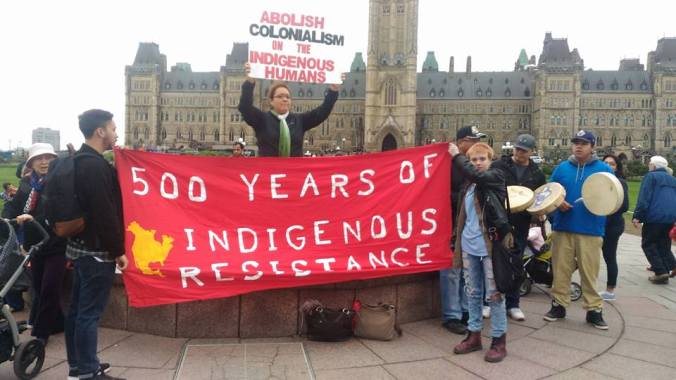
Fuck The 150th! ACA’s Anti-Canada Day Actions
During the 150th birthday of Canada’s confederation, the Revolutionary Communist Party made a call for a coalition to conduct anti-colonial actions on July 1st, Canada Day. This went along with the Revolutionary Communist Party’s campaign called “Fuck the 150th!”
Anti-Colonial Action united with this call for action against Canada’s 150th and the celebrations of colonial genocide that would be taking place. A public statement of support for the coalition was created by Anti-Colonial Action. This document was called “FUCK THE 150TH! A CALL FOR ANTICOLONIAL ACTIONS IN OTTAWA, JULY 1ST.” The coalition that was created was made up of many different activists in Ottawa: anti-colonial Indigenous people, communists, anarchists, and others. Groups like the Revolutionary Student Movement, the Revolutionary Communist Party, Ottawa Against Fascism, Anti-Colonial Action, and the Ottawa Panhandlers Union united and took part in our actions on the first.
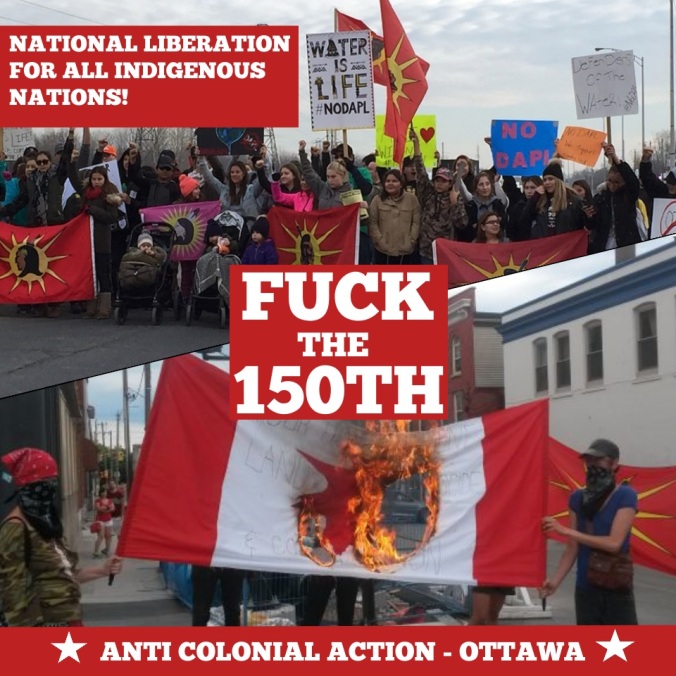
Many meetings took place in preparation, and through them we heard plans for an action in Ottawa being led by the Bawating Water Protectors, an Indigenous organization from outside of Ottawa. With this information, we sent organizers from the coalition to take part. The coalition backed and supported the efforts made for this event.
The action came to be called “Reoccupation” and the work we did was one of support for it. We provided transportation for elders and tipi polls. We provided supplies for the water protectors who were sleeping on the hill. We brought people and banners. We used the platform we had with the “Fuck the 150th” campaign to live stream the action, and to document the actions
taking place during the Reoccupation. We took part every day and night of this action, and we are proud of the work done there, by us and everyone else there.
Everyone left this action with high hopes, proud of what was accomplished. Unfortunately, this would not last, as an uneasy unity broke down.
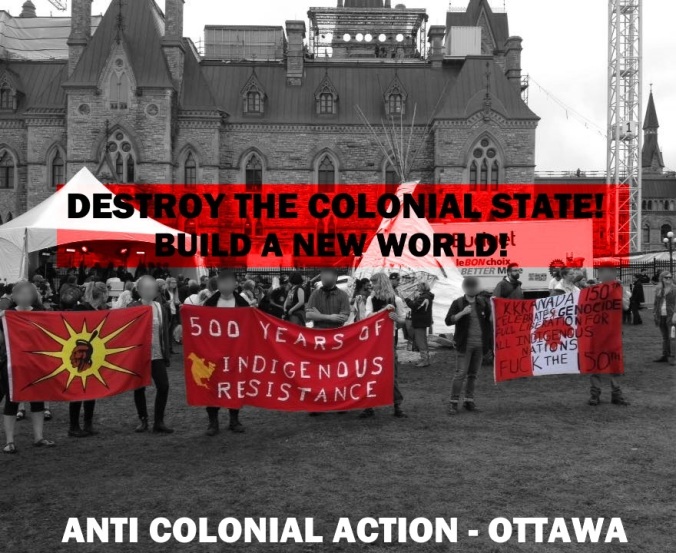
A Case of Snitch – Jacketing By Pork Chop Nationalists
For a full and in-depth explanation of this case, please look to the response of the Revolutionary Communist Party. Their document on this case is called “Ottawa Reoccupation and State Repression – Against Snitch-Jacketing!” To not rewrite what we do not have to, this will just be a short over view of what happened.
Coming out of our work in the Reoccupation, an organizer with Anti-Colonial Action (who is also a supporter of the Revolutionary Communist Party) was targeted by an Indigenous activist in Ottawa. A smear campaign was started, and unfounded accusations of being a cop or a snitch were leveled. This soon also expanded to calling organizations like the Revolutionary Communist Party and the Revolutionary Student Movement snitch or cop organizations. This ostensibly started because of a Vice News article that stated that the RCMP used social media to keep the Reoccupation under surveillance. The RCMP specifically feared the Revolutionary Communist Party making connections with the Indigenous movement, and the struggle toward a United Front of Workers and Oppressed Peoples.
These accusations were unfounded, and were nothing but a campaign of slander against other Indigenous militants and organizations due to political and tactical disagreements. We reject these unprincipled accusations, and we must struggle to build a movement free from slander, and a culture where snitch jacketing cannot go unchallenged.
Moving Forward: Build the Movement!
Anti-Colonial Action Ottawa stagnated for many reasons, including low capacity as a small organization, and work on other projects. Due to this we have not been able to meet for organizational meetings since the Summer of 2017 (outside of coalition work). We have not been able to build our capacities and conduct social investigation into the conditions of the Indigenous people in our city. We have not been able to expand on the ideas we published, and, most importantly, we have not been able to serve our people.
Moving forward we will be restarting regular meetings in Ottawa, beginning with study groups that will be open to any Indigenous people who agree to our points of unity. The goal is to be able to use these meetings to build and grow, and through that growth to be able to conduct social investigation. First though, we must start with be rebuilding our work ethic within Anti-Colonial Action.
We look forward to the reconstruction of our organization, working with our comrades closely, and starting to build up our capacities again. With struggle will come great work, and we are a group that is willing to conduct that work.
Now is the time to move forward! The capitalist settler colonial state has shown fear in the unity of the revolutionary working class and the indigenous movement for national liberation. It is now that we must forge ahead and build the United Front of Workers and Oppressed Peoples! This task is a historic necessity and we owe it to our people and the oppressed masses to move this work a head.
What do we have? Nothing! What do we want? Everything! We have a world to win and now is the time to start building towards this fact.
If you are an Indigenous person in or around Ottawa and want to take part in Anti-Colonial Action, please reach out to us in a private message and we can give provide you with all the necessary information.
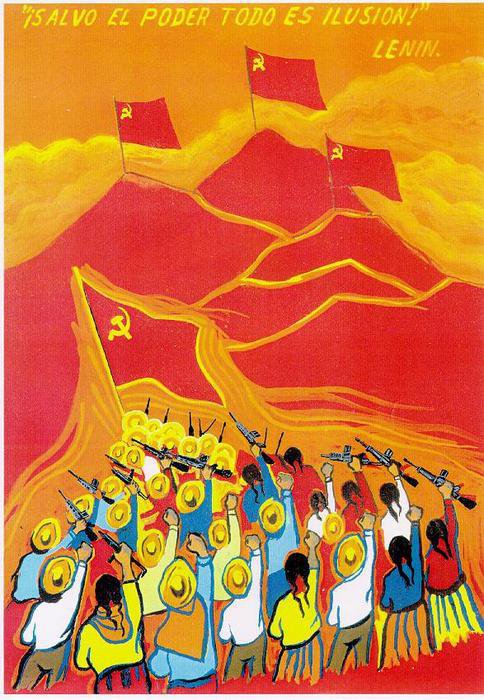
FORWARD WITH THE ANTI-COLONIAL MOVEMENT!
FORWARD WITH ANTI-COLONIAL ACTION!
Referenced Documents:
What Is Anti Colonial Action Ottawa?: https://acaottawa.wordpress.com/2016/07/05/what-is-anti-colonial-action-ottawa/
Decolonization Is Revolution!: https://acaottawa.wordpress.com/2016/07/19/decolonization-is-revolution/
FUCK THE 150TH! A CALL FOR ANTI-COLONIAL ACTIONS IN OTTAWA, JULY 1ST: https://acaottawa.wordpress.com/2017/06/01/fuck-the-150th-a-call-for-anti-colonial-actions-in-ottawa-july-1st/
Ottawa Reoccupation and State Repression – Against Snitch-Jacketing!: https://www.pcrrcp.ca/en/5910
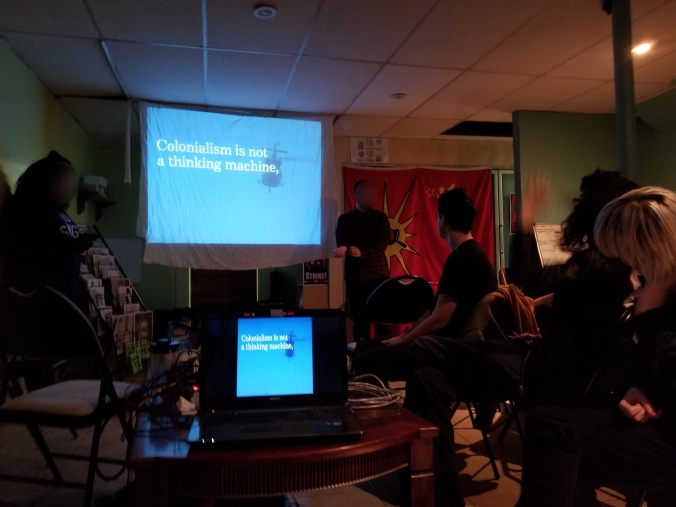

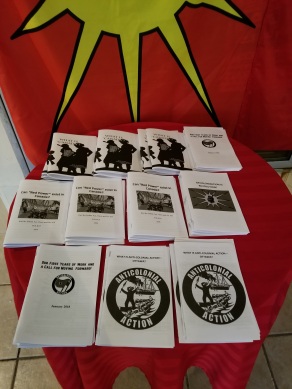
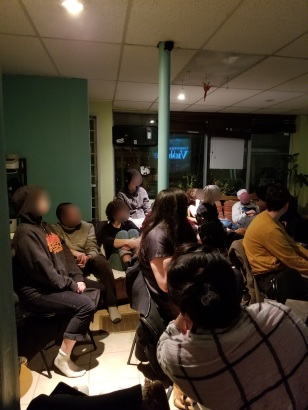

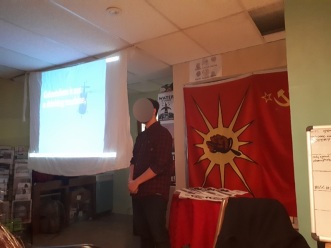
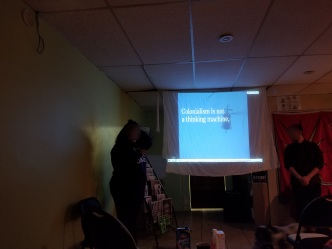
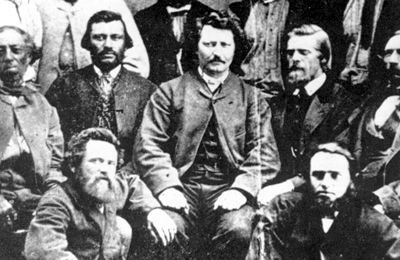



 This document is being written by Anti-Colonial Action as an attempt to shed light on our work in Ottawa, to have a critical look both at what we have created and where we did not achieve our goals. We recognize that we have not published anything concerning what we have been doing, what has been going on, and even whether or not we are still active. We understand that this leads to a lot of questions, and makes it unclear what Anti Colonial Action has done and has not done. The purpose of this document is to shed light on us, our work, our shortcomings, and why things have gone the way they did. We are also calling for the reconstruction of our group so that we can build on our foundational work and move forward with Anti-Colonial Action in Ottawa.
This document is being written by Anti-Colonial Action as an attempt to shed light on our work in Ottawa, to have a critical look both at what we have created and where we did not achieve our goals. We recognize that we have not published anything concerning what we have been doing, what has been going on, and even whether or not we are still active. We understand that this leads to a lot of questions, and makes it unclear what Anti Colonial Action has done and has not done. The purpose of this document is to shed light on us, our work, our shortcomings, and why things have gone the way they did. We are also calling for the reconstruction of our group so that we can build on our foundational work and move forward with Anti-Colonial Action in Ottawa.






